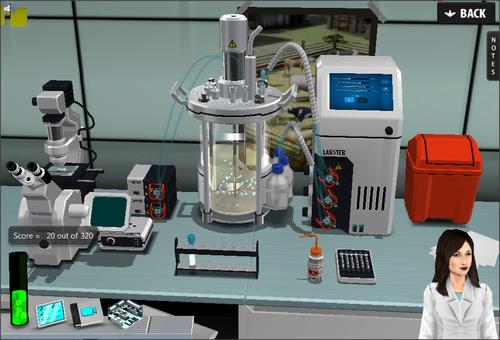A group of startups pitching their educational wares at The Next Web conference in Amsterdam Friday are betting that what will hold students' attention is play.
A contest at the conference drew more than 100 applicants from 24 European countries to compete for a €25,000 (US$34,500) cash prize; the winner was Danish company Labster, which makes a simulated, virtual laboratory.
Traditional lab teaching costs about $500 per semester per student, said Mads Bonde, Labster's CEO, but his company's virtual lab is offered for one tenth of that price. While customers include Boston University, Stanford University and the University of Copenhagen, the software can also be used by high schools or in corporate settings. The virtual lab can make science appealing by giving students the opportunity to safely conduct what would be dangerous experiments in the real world (think, explosions) and also makes a detective game out of projects like DNA analysis.
Another startup looking to gaming to engage pupils is WeWantToKnow, which teaches algebra. The French company's app presents players with icons that must be manipulated in such a way that the unknown item called the DragonBox is isolated on one side of the gaming board. The icons are gradually replaced with numbers and variables and eventually the player is solving real equations.
WeWantToKnow wants to turn math, often a tedious and boring topic, into a fun learning experience, said Frédéric Martin, COO. The app comes in versions for children 5-12, and for children older than 12, costing $6 and $10 respectively. The vast majority of the company's $770,000 in sales last year were to parents, Martin said, but the hope is to broaden its reach into classrooms as well.
Bulgarian startup Nimero is also seeking to gamify math teaching. Its Jumpido combines math games with a Microsoft Kinect sensor so that children can move while learning. Jumpido is meant for ages 6 to 12 and is sold to primary schools in a hardware and software bundle that costs €550, CEO Kiril Rusev said.
Taking a broader approach is London-based Eduvee with its personalized digital tutor, the aim of which is to allow students to take control of their own learning experience, said Chirag Patel, one of the company's co-founders.
Eduvee sorts content from text books and online sources into subject areas like "volcanoes" or "DNA" and makes those topics available through its online platform. A student who wants to learn about volcanoes is shown a screen with information from different sources, including YouTube videos, Patel said. Another pupil studying the same topic can be served an entirely different screen based on personal preferences and previous learning experiences, to provide a personal learning environment. The lessons are followed by questions, and if pupils answer correctly they can build up a score, almost turning it into a game, Patel said.
Currently, Eduvee has about 16,000 users and over 300,000 lesson views. It aims to offer a private tutor service for about $5 per month, Patel said. The company offers textbook publishers a share of revenue and also digitizes their material for online use.
While gaming certainly helps to engage children in education, it is not the whole answer to improving learning, said John Martin, CEO of Sanoma Learning, the educational technology company that chose the contest winner. "I don't think that doing maths only through a game will take you far enough," he said.
Great education depends first on great teachers and good methods, he said. However, gamification can help children get engaged and motivated.
"The nice thing about games is that it allows you to capture data," he said, data that can be used to steer a more personal learning process.
Education is moving from an industrial model where a teacher stands in front of 30 students teaching everybody the same thing, to a more personal learning experience, he said. "I do think that personalization is going to be the future of learning."
Loek is Amsterdam Correspondent and covers online privacy, intellectual property, open-source and online payment issues for the IDG News Service. Follow him on Twitter at @loekessers or email tips and comments to loek_essers@idg.com
Join the CIO Australia group on LinkedIn. The group is open to CIOs, IT Directors, COOs, CTOs and senior IT managers.




